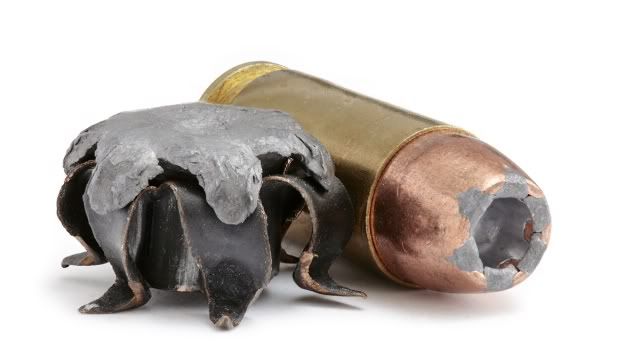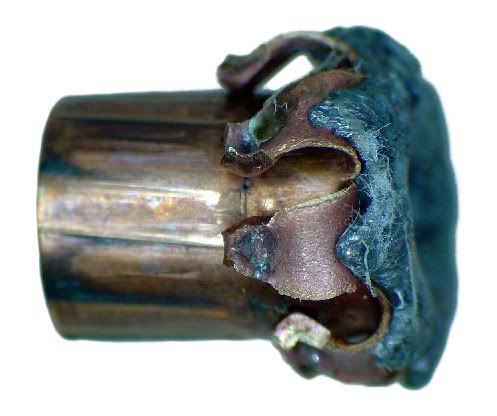Not true. The hollow point round was not designed to penetrate vests. Hollow point rounds are used every day by millions of gun owners as self defense ammo... because it is a safer option.
What is a hollow point?
A hollow point round has a hole in the center of it instead of the round or flat projectile. The reason for this hole is to cause the round to expand, opening up like a mushroom. What this expansion does is as follows:
- Yes, it does cause a large wound channel. This stops an attacker faster.
- Envision two cars, one with a flat front and a sports car with a pointed front. Which one moves faster? The pointed front cuts through the air while the flat front is pushing against it. The spreading of the hollow point slows the round down. The theory behind this is that will help cut down velocity that causes a round nosed bullet to keep going. It prevents over penetration (helps to stop the round from coming out the back and hitting someone else) or continuing through a wall.
So what bothers so many people about them?
Because of misunderstandings and twisting of facts, people have been lead to believe that this spreading bullet makes it easier to penetrate a bullet resistant vest. The truth is, a round with a pointed end is far more likely to go through a vest as opposed to one that spreads. Bullet resistant vests are made of fibers designed to resist bullets. A pointed end is more likely to break apart these fibers. Most handguns do not have pointed ammo. But many hunting rifles do. And a vest is not usually designed to hold up to something as large as a .308 deer rifle. But because hollow points open up and become larger, people assume this causes more damage to a vest.
Many ammo companies have designed a self defense round that acts much like a hollow point, but without the scary hole. Federal Ammunition makes a round called an expanding full metal jacket. It looks like any other inexpensive round you may use to practice with, but the round opens and mushrooms just like a hollow point. And recently Hornady released a round called Critical Defense, which is a round with a polymer in the hole. It does the same thing as a hollow point, but the actual hole is missing. These rounds are not illegal in many states that outlaw hollow points. I didn't say it made sense.
Can't I just use the rounds I bought for a few dollars at Walmart? They're still bullets!
Of course you can. The full metal jacket rounds you got will work in a defense situation. But the problem you face with them is over penetration. A full metal jacket round is far more likely to go through walls, and is far more likely to come out the back of an attacker, at which point you have no control over where that round goes. And you are still responsible for where it goes.
But the media is usually correct when it talks about these cop killer bullets. Look at the Black Talons!
"In early 1992 Winchester introduced the "Black Talon", a newly designed hollow-point handgun bullet which used a specially designed, reverse tapered jacket. The jacket was cut at the hollow to intentionally weaken it, and these cuts allowed the jacket to open into six petals upon impact. The thick jacket material kept the tips of the jacket from bending as easily as a normal thickness jacket. The slits that weakened the jacket left triangular shapes in the tip of the jacket, and these triangular sections of jacket would end up pointing out after expansion, leading to the "Talon" name. The bullets were coated with a black colored, paint-like lubricant called "Lubalox," and loaded into nickel-plated brass cases, which made them visually stand out from other ammunition. While actual performance of the Black Talon rounds was not significantly better than any other comparable high performance hollow-point ammunition, the reverse taper jacket did provide reliable expansion under a wide range of conditions, and many police departments adopted the round.[10]
Winchester's "Black Talon" product name was eventually used against them. After a high profile shooting at 101 California Street, San Francisco in 1993, media response against Winchester was swift. "This bullet kills you better", says one report; "its six razorlike claws unfold on impact, expanding to nearly three times the bullet's diameter".[11][12] A concern was raised by the American College of Emergency Physicians that the sharp edges of the jacket could penetrate surgical gloves, increasing the risk of blood-borne infections being transmitted to medical personnel treating the gunshot wound. While possible, there are no recorded cases of such an infection occurring in relation to the Black Talon bullets.[13]
Winchester responded to the media criticism of the Black Talon line by removing it from the civilian market and only selling it to law enforcement distributors, and it has since been discontinued entirely."
From: Black Talon



No comments:
Post a Comment